Isofraxidin
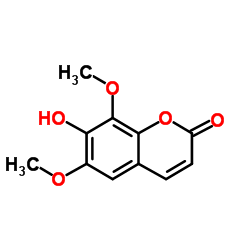
Isofraxidin structure
|
Common Name | Isofraxidin | ||
|---|---|---|---|---|
| CAS Number | 486-21-5 | Molecular Weight | 222.194 | |
| Density | 1.4±0.1 g/cm3 | Boiling Point | 452.1±45.0 °C at 760 mmHg | |
| Molecular Formula | C11H10O5 | Melting Point | >300 °C(lit.) | |
| MSDS | Chinese USA | Flash Point | 183.2±22.2 °C | |
Use of IsofraxidinIsofraxidin, a coumarin component from Acanthopanax senticosus, inhibits MMP-7 expression and cell invasion of human hepatoma cells. Isofraxidin inhibits the phosphorylation of ERK1/2 in hepatoma cells[1]. Isofraxidin attenuates the expression of iNOS and COX-2, Isofraxidinalso inhibits TLR4/myeloid differentiation protein-2 (MD-2) complex formation[2]. |
| Name | 7-hydroxy-6,8-dimethoxychromen-2-one |
|---|---|
| Synonym | More Synonyms |
| Description | Isofraxidin, a coumarin component from Acanthopanax senticosus, inhibits MMP-7 expression and cell invasion of human hepatoma cells. Isofraxidin inhibits the phosphorylation of ERK1/2 in hepatoma cells[1]. Isofraxidin attenuates the expression of iNOS and COX-2, Isofraxidinalso inhibits TLR4/myeloid differentiation protein-2 (MD-2) complex formation[2]. |
|---|---|
| Related Catalog | |
| Target |
COX-2 TLR4 MMP-7 |
| In Vitro | Isofraxidin inhibits expression of MMP-7 and in vitro cell invasion at a non-toxic level through inhibiting ERK1/2 phosphorylation in hepatoma cell lines[1]. Isofraxidin competitively inhibits TLR4/MD-2 complex formation, and thus TLR4/NF-κB signalling cascades.Isofraxidin has potential in the treatment of Osteoarthritis (OA)[2]. |
| References |
| Density | 1.4±0.1 g/cm3 |
|---|---|
| Boiling Point | 452.1±45.0 °C at 760 mmHg |
| Melting Point | >300 °C(lit.) |
| Molecular Formula | C11H10O5 |
| Molecular Weight | 222.194 |
| Flash Point | 183.2±22.2 °C |
| Exact Mass | 222.052826 |
| PSA | 68.90000 |
| LogP | 1.31 |
| Vapour Pressure | 0.0±1.1 mmHg at 25°C |
| Index of Refraction | 1.588 |
| InChIKey | HOEVRHHMDJKUMZ-UHFFFAOYSA-N |
| SMILES | COc1cc2ccc(=O)oc2c(OC)c1O |
| Storage condition | ?20°C |
| Water Solubility | slightly soluble |
|
SECTION 1: Identification of the substance/mixture and of the company/undertaking Product identifiers Product name: Isofraxidin REACH No.: A registration number is not available for this substance as the substance or its uses are exempted from registration, the annual tonnage does not require a registration or the registration is envisaged for a later registration deadline.
CAS-No.: 486-21-5 Relevant identified uses of the substance or mixture and uses advised against Identified uses: Laboratory chemicals, Manufacture of substances SECTION 2: Hazards identification Classification of the substance or mixture Not a hazardous substance or mixture according to Regulation (EC) No. 1272/2008. This substance is not classified as dangerous according to Directive 67/548/EEC. Label elements The product does not need to be labelled in accordance with EC directives or respective national laws. Other hazards - none SECTION 3: Composition/information on ingredients Substances Synonyms: 6,8-Dimethoxyumbelliferone 7-Hydroxy-6,8-dimethoxycoumarin 7-Hydroxy-6,8-dimethoxychromen-2-one Formula: C11H10O5 Molecular Weight: 222,19 g/mol CAS-No.: 486-21-5 No components need to be disclosed according to the applicable regulations. SECTION 4: First aid measures Description of first aid measures If inhaled If breathed in, move person into fresh air. If not breathing, give artificial respiration. In case of skin contact Wash off with soap and plenty of water. In case of eye contact Flush eyes with water as a precaution. If swallowed Never give anything by mouth to an unconscious person. Rinse mouth with water. Most important symptoms and effects, both acute and delayed The most important known symptoms and effects are described in the labelling (see section 2.2) and/or in section 11 Indication of any immediate medical attention and special treatment needed no data available SECTION 5: Firefighting measures Extinguishing media Suitable extinguishing media Use water spray, alcohol-resistant foam, dry chemical or carbon dioxide. Special hazards arising from the substance or mixture Carbon oxides Advice for firefighters Wear self contained breathing apparatus for fire fighting if necessary. Further information no data available SECTION 6: Accidental release measures Personal precautions, protective equipment and emergency procedures Avoid dust formation. Avoid breathing vapours, mist or gas. For personal protection see section 8. Environmental precautions Do not let product enter drains. Methods and materials for containment and cleaning up Sweep up and shovel. Keep in suitable, closed containers for disposal. Reference to other sections For disposal see section 13. SECTION 7: Handling and storage Precautions for safe handling Provide appropriate exhaust ventilation at places where dust is formed. For precautions see section 2.2. Conditions for safe storage, including any incompatibilities Store in cool place. Keep container tightly closed in a dry and well-ventilated place. Recommended storage temperature: -20 °C Specific end use(s) Apart from the uses mentioned in section 1.2 no other specific uses are stipulated SECTION 8: Exposure controls/personal protection Control parameters Components with workplace control parameters Exposure controls Appropriate engineering controls General industrial hygiene practice. Personal protective equipment Eye/face protection Use equipment for eye protection tested and approved under appropriate government standards such as NIOSH (US) or EN 166(EU). Skin protection Handle with gloves. Gloves must be inspected prior to use. Use proper glove removal technique (without touching glove's outer surface) to avoid skin contact with this product. Dispose of contaminated gloves after use in accordance with applicable laws and good laboratory practices. Wash and dry hands. The selected protective gloves have to satisfy the specifications of EU Directive 89/686/EEC and the standard EN 374 derived from it. Full contact Material: Nitrile rubber Minimum layer thickness: 0,11 mm Break through time: 480 min Material tested:Dermatril® (KCL 740 / Z677272, Size M) Splash contact Material: Nitrile rubber Minimum layer thickness: 0,11 mm Break through time: 480 min Material tested:Dermatril® (KCL 740 / Z677272, Size M) data source: KCL GmbH, D-36124 Eichenzell, phone +49 (0)6659 87300 test method: EN374 If used in solution, or mixed with other substances, and under conditions which differ from EN 374, contact the supplier of the CE approved gloves. This recommendation is advisory only and must be evaluated by an industrial hygienist and safety officer familiar with the specific situation of anticipated use by our customers. It should not be construed as offering an approval for any specific use scenario. Body Protection Choose body protection in relation to its type, to the concentration and amount of dangerous substances, and to the specific work-place., The type of protective equipment must be selected according to the concentration and amount of the dangerous substance at the specific workplace. Respiratory protection Respiratory protection is not required. Where protection from nuisance levels of dusts are desired, use type N95 (US) or type P1 (EN 143) dust masks. Use respirators and components tested and approved under appropriate government standards such as NIOSH (US) or CEN (EU). Control of environmental exposure Do not let product enter drains. SECTION 9: Physical and chemical properties Information on basic physical and chemical properties a) AppearanceForm: crystalline Colour: light yellow b) Odourno data available c) Odour Thresholdno data available d) pHno data available e) Melting point/freezing146 - 149 °C point f) Initial boiling point and no data available boiling range g) Flash pointno data available h) Evapouration rateno data available i) Flammability (solid, gas) no data available j) Upper/lowerno data available flammability or explosive limits k) Vapour pressureno data available l) Vapour densityno data available m) Relative densityno data available n) Water solubilityno data available o) Partition coefficient: n- log Pow: 1,649 octanol/water p) Auto-ignitionno data available temperature q) Decompositionno data available temperature r) Viscosityno data available s) Explosive propertiesno data available t) Oxidizing propertiesno data available Other safety information no data available SECTION 10: Stability and reactivity Reactivity no data available Chemical stability Stable under recommended storage conditions. Possibility of hazardous reactions no data available Conditions to avoid no data available Incompatible materials Strong oxidizing agents Hazardous decomposition products In the event of fire: see section 5 SECTION 11: Toxicological information Information on toxicological effects Acute toxicity no data available Skin corrosion/irritation no data available Serious eye damage/eye irritation no data available Respiratory or skin sensitisation no data available Germ cell mutagenicity no data available Carcinogenicity IARC:No component of this product present at levels greater than or equal to 0.1% is identified as probable, possible or confirmed human carcinogen by IARC. Reproductive toxicity no data available Specific target organ toxicity - single exposure no data available Specific target organ toxicity - repeated exposure no data available Aspiration hazard no data available Additional Information RTECS: Not available To the best of our knowledge, the chemical, physical, and toxicological properties have not been thoroughly investigated. SECTION 12: Ecological information Toxicity no data available Persistence and degradability no data available Bioaccumulative potential no data available Mobility in soil no data available Results of PBT and vPvB assessment PBT/vPvB assessment not available as chemical safety assessment not required/not conducted Other adverse effects no data available SECTION 13: Disposal considerations Waste treatment methods Product Offer surplus and non-recyclable solutions to a licensed disposal company. Contaminated packaging Dispose of as unused product. SECTION 14: Transport information UN number ADR/RID: -IMDG: -IATA: - UN proper shipping name ADR/RID: Not dangerous goods IMDG: Not dangerous goods IATA:Not dangerous goods Transport hazard class(es) ADR/RID: -IMDG: -IATA: - Packaging group ADR/RID: -IMDG: -IATA: - Environmental hazards ADR/RID: noIMDG Marine pollutant: noIATA: no Special precautions for user no data available SECTION 15: Regulatory information This safety datasheet complies with the requirements of Regulation (EC) No. 1907/2006. Safety, health and environmental regulations/legislation specific for the substance or mixture no data available Chemical Safety Assessment For this product a chemical safety assessment was not carried out SECTION 16: Other information Further information Copyright 2014 Co. LLC. License granted to make unlimited paper copies for internal use only. The above information is believed to be correct but does not purport to be all inclusive and shall be used only as a guide. The information in this document is based on the present state of our knowledge and is applicable to the product with regard to appropriate safety precautions. It does not represent any guarantee of the properties of the product. Corporation and its Affiliates shall not be held liable for any damage resulting from handling or from contact with the above product. See and/or the reverse side of invoice or packing slip for additional terms and conditions of sale. |
CHEMICAL IDENTIFICATION
HEALTH HAZARD DATAACUTE TOXICITY DATA
|
| Hazard Codes | Xn |
|---|---|
| Risk Phrases | R20/21/22:Harmful by inhalation, in contact with skin and if swallowed . |
| Safety Phrases | S23-S28-S28A-S25 |
| RIDADR | NONH for all modes of transport |
| WGK Germany | 1 |
| RTECS | OY2300000 |
| Precursor 8 | |
|---|---|
| DownStream 2 | |
|
Determination of isofraxidin and astilbin by HPLC in rat plasma and its application after orally administration the extract of Sarcandra glabra.
Pak. J. Pharm. Sci. 26(1) , 1-6, (2013) Sarcandra glaber is a common traditional Chinese medicine used to treat psoriasis and other infectious diseases, isofraxidin and astilbin are the main components of it. In order to study the pharmacok... |
|
|
Active components from Siberian ginseng (Eleutherococcus senticosus) for protection of amyloid β(25-35)-induced neuritic atrophy in cultured rat cortical neurons.
J. Nat. Med. 65(3-4) , 417-23, (2011) Not only neuronal death but also neuritic atrophy and synaptic loss underlie the pathogenesis of Alzheimer's disease as direct causes of the memory deficit. Extracts of Siberian ginseng (the rhizome o... |
|
|
Simultaneous determination of protocatechuic acid, syringin, chlorogenic acid, caffeic acid, liriodendrin and isofraxidin in Acanthopanax senticosus Harms by HPLC-DAD.
Biol. Pharm. Bull. 29(3) , 532-4, (2006) A high performance liquid chromatography (HPLC) method was developed for the first time to quantify simultaneously the six major active ingredients in Acanthopanax senticosus (Rupr. et Maxim.) Harms, ... |
| isoferaxidin |
| 7-Hydroxy-6,8-dimethoxy-2H-chromen-2-one |
| iso-Fraxidin |
| Phytodolor |
| 6,8-dimethoxy-7-hydroxycoumarin |
| MFCD00221757 |
| 7-Hydroxy-6,8-dimethoxy-2H-1-benzopyran-2-one |
| 7-Hydroxy-6,8-dimethoxy coumarin |
| Coumarin,7-hydroxy-6,8-dimethoxy |
| Isofraxidin |
| 7-hydroxy-6,8-dimethoxy-chromen-2-one |
| 6,8-Dimethoxyumbelliferone,7-Hydroxy-6,8-dimethoxychromen-2-one,7-Hydroxy-6,8-dimethoxycoumarin |
| Umbelliferone,6,8-dimethoxy |
| 7-Hydroxy-6,8-dimethoxy-cumarin |
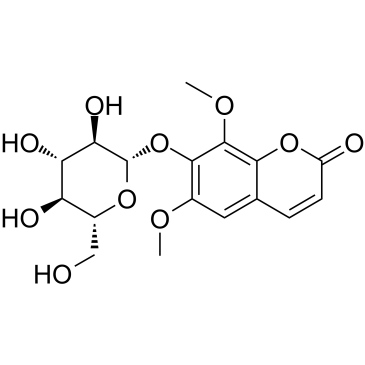 CAS#:483-91-0
CAS#:483-91-0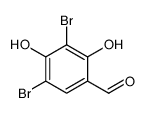 CAS#:116096-91-4
CAS#:116096-91-4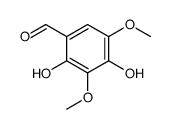 CAS#:182427-46-9
CAS#:182427-46-9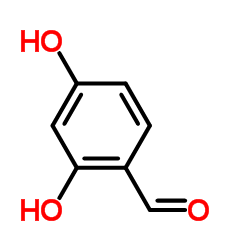 CAS#:95-01-2
CAS#:95-01-2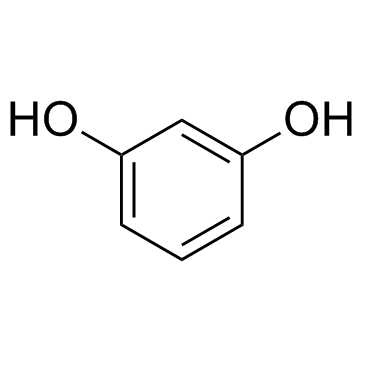 CAS#:108-46-3
CAS#:108-46-3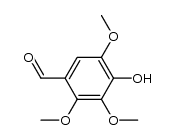 CAS#:149143-80-6
CAS#:149143-80-6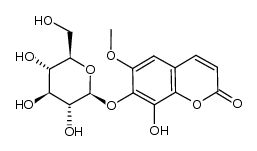 CAS#:24778-11-8
CAS#:24778-11-8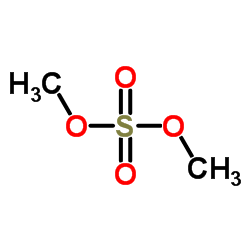 CAS#:77-78-1
CAS#:77-78-1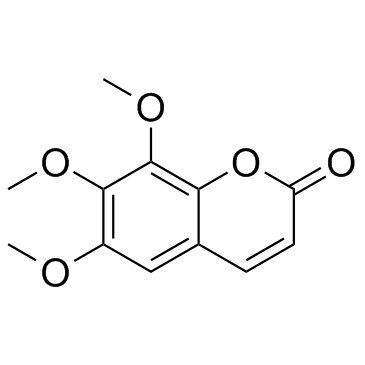 CAS#:6035-49-0
CAS#:6035-49-0 CAS#:114371-80-1
CAS#:114371-80-1
